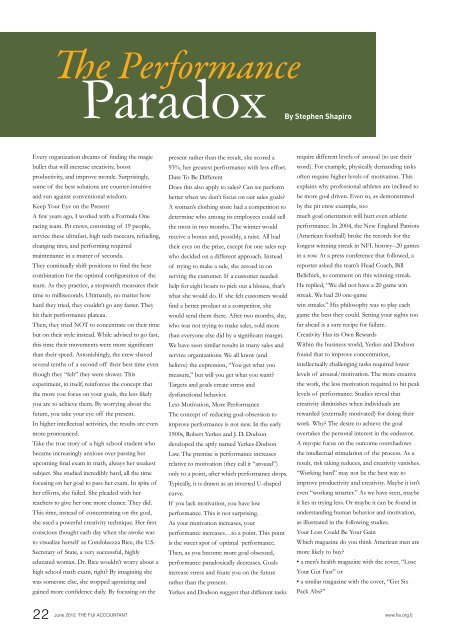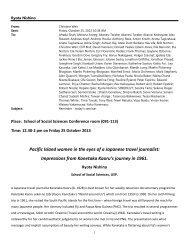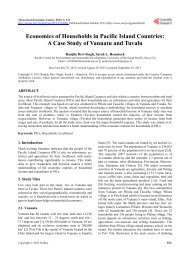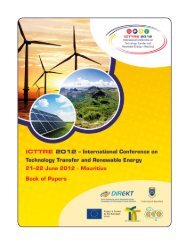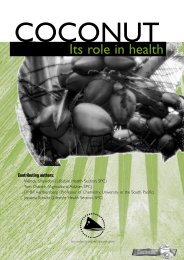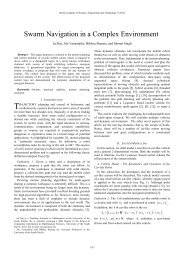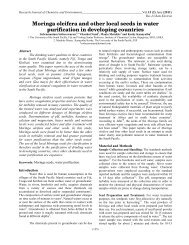Download - Fiji Institute of Accountants
Download - Fiji Institute of Accountants
Download - Fiji Institute of Accountants
Create successful ePaper yourself
Turn your PDF publications into a flip-book with our unique Google optimized e-Paper software.
The Performance<br />
Paradox By Stephen Shapiro<br />
Every organization dreams <strong>of</strong> finding the magic<br />
bullet that will increase creativity, boost<br />
productivity, and improve morale. Surprisingly,<br />
some <strong>of</strong> the best solutions are counter-intuitive<br />
and run against conventional wisdom.<br />
Keep Your Eye on the Present<br />
A few years ago, I worked with a Formula One<br />
racing team. Pit crews, consisting <strong>of</strong> 19 people,<br />
service these ultrafast, high tech racecars, refueling,<br />
changing tires, and performing required<br />
maintenance in a matter <strong>of</strong> seconds.<br />
They continually shift positions to find the best<br />
combination for the optimal configuration <strong>of</strong> the<br />
team. As they practice, a stopwatch measures their<br />
time to milliseconds. Ultimately, no matter how<br />
hard they tried, they couldn’t go any faster. They<br />
hit their performance plateau.<br />
Then, they tried NOT to concentrate on their time<br />
but on their style instead. While advised to go fast,<br />
this time their movements were more significant<br />
than their speed. Astonishingly, the crew shaved<br />
several tenths <strong>of</strong> a second <strong>of</strong>f their best time even<br />
though they “felt” they were slower. This<br />
experiment, in itself, reinforces the concept that<br />
the more you focus on your goals, the less likely<br />
you are to achieve them. By worrying about the<br />
future, you take your eye <strong>of</strong>f the present.<br />
In higher intellectual activities, the results are even<br />
more pronounced.<br />
Take the true story <strong>of</strong> a high school student who<br />
became increasingly anxious over passing her<br />
upcoming final exam in math, always her weakest<br />
subject. She studied incredibly hard, all the time<br />
focusing on her goal to pass her exam. In spite <strong>of</strong><br />
her efforts, she failed. She pleaded with her<br />
teachers to give her one more chance. They did.<br />
This time, instead <strong>of</strong> concentrating on the goal,<br />
she used a powerful creativity technique. Her first<br />
conscious thought each day when she awoke was<br />
to visualize herself as Condoleezza Rice, the U.S.<br />
Secretary <strong>of</strong> State, a very successful, highly<br />
educated woman. Dr. Rice wouldn’t worry about a<br />
high school math exam, right? By imagining she<br />
was someone else, she stopped agonizing and<br />
gained more confidence daily. By focusing on the<br />
present rather than the result, she scored a<br />
93%, her greatest performance with less effort.<br />
Dare To Be Different<br />
Does this also apply to sales? Can we perform<br />
better when we don’t focus on our sales goals?<br />
A woman’s clothing store had a competition to<br />
determine who among its employees could sell<br />
the most in two months. The winner would<br />
receive a bonus and, possibly, a raise. All had<br />
their eyes on the prize, except for one sales rep<br />
who decided on a different approach. Instead<br />
<strong>of</strong> trying to make a sale, she zeroed in on<br />
serving the customer. If a customer needed<br />
help for eight hours to pick out a blouse, that’s<br />
what she would do. If she felt customers would<br />
find a better product at a competitor, she<br />
would send them there. After two months, she,<br />
who was not trying to make sales, sold more<br />
than everyone else did by a significant margin.<br />
We have seen similar results in many sales and<br />
service organizations. We all know (and<br />
believe) the expression, “You get what you<br />
measure,” but will you get what you want?<br />
Targets and goals create stress and<br />
dysfunctional behavior.<br />
Less Motivation, More Performance<br />
The concept <strong>of</strong> reducing goal-obsession to<br />
improve performance is not new. In the early<br />
1900s, Robert Yerkes and J. D. Dodson<br />
developed the aptly named Yerkes-Dodson<br />
Law. The premise is performance increases<br />
relative to motivation (they call it “arousal”)<br />
only to a point, after which performance drops.<br />
Typically, it is drawn as an inverted U-shaped<br />
curve.<br />
If you lack motivation, you have low<br />
performance. This is not surprising.<br />
As your motivation increases, your<br />
performance increases…to a point. This point<br />
is the sweet spot <strong>of</strong> optimal performance.<br />
Then, as you become more goal obsessed,<br />
performance paradoxically decreases. Goals<br />
increase stress and fixate you on the future<br />
rather than the present.<br />
Yerkes and Dodson suggest that different tasks<br />
require different levels <strong>of</strong> arousal (to use their<br />
word). For example, physically demanding tasks<br />
<strong>of</strong>ten require higher levels <strong>of</strong> motivation. This<br />
explains why pr<strong>of</strong>essional athletes are inclined to<br />
be more goal driven. Even so, as demonstrated<br />
by the pit crew example, too<br />
much goal orientation will hurt even athletic<br />
performance. In 2004, the New England Patriots<br />
(American football) broke the records for the<br />
longest winning streak in NFL history--20 games<br />
in a row. At a press conference that followed, a<br />
reporter asked the team’s Head Coach, Bill<br />
Belichick, to comment on this winning streak.<br />
He replied, “We did not have a 20 game win<br />
streak. We had 20 one-game<br />
win streaks.” His philosophy was to play each<br />
game the best they could. Setting your sights too<br />
far ahead is a sure recipe for failure.<br />
Creativity Has its Own Rewards<br />
Within the business world, Yerkes and Dodson<br />
found that to improve concentration,<br />
intellectually challenging tasks required lower<br />
levels <strong>of</strong> arousal/motivation. The more creative<br />
the work, the less motivation required to hit peak<br />
levels <strong>of</strong> performance. Studies reveal that<br />
creativity diminishes when individuals are<br />
rewarded (externally motivated) for doing their<br />
work. Why? The desire to achieve the goal<br />
overtakes the personal interest in the endeavor.<br />
A myopic focus on the outcome overshadows<br />
the intellectual stimulation <strong>of</strong> the process. As a<br />
result, risk taking reduces, and creativity vanishes.<br />
“Working hard” may not be the best way to<br />
improve productivity and creativity. Maybe it isn’t<br />
even “working smarter.” As we have seen, maybe<br />
it lies in trying less. Or maybe it can be found in<br />
understanding human behavior and motivation,<br />
as illustrated in the following studies.<br />
Your Loss Could Be Your Gain<br />
Which magazine do you think American men are<br />
more likely to buy?<br />
• a men’s health magazine with the cover, “Lose<br />
Your Gut Fast” or<br />
• a similar magazine with the cover, “Get Six<br />
Pack Abs?”<br />
22 June 2012. The FiJi AccounTAnT www.fia.org.fj


